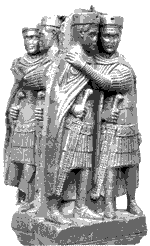- Feb 7, 2004
- 5,631
- 3,351
Preamble: Boys from the 'Hood – The Meritocracy of Diocletian

Diocletian (son of a freed slave) supported by Maximian (son of a shop keeper) – a successful partnership that lasted over twenty years.

Diocletian and Maximian, now supported by two deputy caesars Galerius and Constantius.
It was the son of the least of them – Constantine – who set his sights on restoring absolute and undivided power.
Diocletian – Son of a Slave Makes Good
Diocletian was the product of merit and of the social mobility which was possible in the late third century.
Diocletian ruled the Roman world for over twenty years. Neither mad nor debauched, he (uniquely) retired from power and famously boasted of growing cabbages "with his own hand" in retirement.
Diocletian had recognised that the empire was too vast for one man's autocratic rule and had sensibly divided absolute power between four monarchs. At the same time he put in place a mechanism for orderly succession, with the junior Caesars stepping up to the rank of Augustus and appointing deputy Caesars in turn. Moreover, Diocletian had had the wisdom to chose colleagues and successors on the basis of ability and loyalty, not blood-ties. The tetrarchy provided orderly succession for a generation. The provinces themselves were grouped into a dozen Dioceses, each ruled by a Vicar.
Constantine – Pampered Prince Enters the Ring
As caesar of Britain and Gaul, Constantine's father – Constantius – had been chosen for the most junior post in the tetrarchy. Constantine himself had been obliged to spend his youth at Nicomedia – as 'hostage' in the court of Diocletian.
When the ailing Diocletian stepped down as Augustus after twenty years in 305, Constantine was dismayed that he had been passed over for the position of caesar. Galerius became senior Augustus in the east. Frustrated, and fearful for his life, Constantine fled to Gaul to join his father, and together they campaigned in northern Britain.
Constantius – nicknamed 'Chlorus' because of his pale and sickly complexion – died at Eburacum (York) the following year and Constantine was 'proclaimed' Augustus by the troops in what was the most marginal of frontier provinces. The ambitious prince was now vulnerable to a charge of usurping imperial authority. His unauthorized promotion was a blow against the Tetrarchy which had stabilized the Roman world. The empire had almost collapsed during the 3rd century because of military rebellions and only a generation before, Aurelian had brought to an end fifteen years of secession by the western provinces. Subsequently, Constantine's own father had invaded Britain precisely to end a decade of separate imperium in the province under the rebel emperors Carausius and Allectus.
Constantine immediately left Britain and the legionary fortress where he had been acclaimed to establish a firmer base with the legions of the Rhineland. He moved quickly to establish a court in the northern city of Augusta Treverorum (Trier) – often a secessionist capital – but his sights were on a far bigger prize.
Like his father before him, Constantine abandoned a concubine (the mother of his child) to make a politically useful marriage into the family of the senior Augustus (and rival), Maximian, Diocletian's original colleague, who had returned to imperial politics from an unwelcome retirement. Soon after, Maximian was dead, almost certainly on the orders of his new son-in-law. In the eastern capital an unhappy Galerius reluctantly acknowledged Constantine as a caesar but appointed his own nominee – Severus – as supreme ruler for the west.
In the meantime, Maxentius (son of Maximian and now Constantine's brother-in-law!) had been proclaimed Augustus in Rome by the praetorian guard. Severus lost his life in an unsuccessful attempt to remove the usurper.
Conversion? My Enemy's Enemy is My Friend
In Constantine's day, the eastern provinces were by far the richest and most populous of the Roman world. Some of its cities – Pergamon, Symrna, Antioch and so on – had existed for almost a millennium and had accumulated vast wealth from international trade and venerated cult centres. Through its numerous cities passed Roman gold going east in exchange for imports from Persia, India and Arabia. Flowing west with those exotic imports came exotic 'mystery religions' to titillate and enthrall Roman appetites.
In contrast, the western provinces now ruled by Constantine were more recently colonized and less developed. Its cities were small 'new towns', its hinterland still barbarian. Duri






 ... please make yourself at home ...
... please make yourself at home ... 